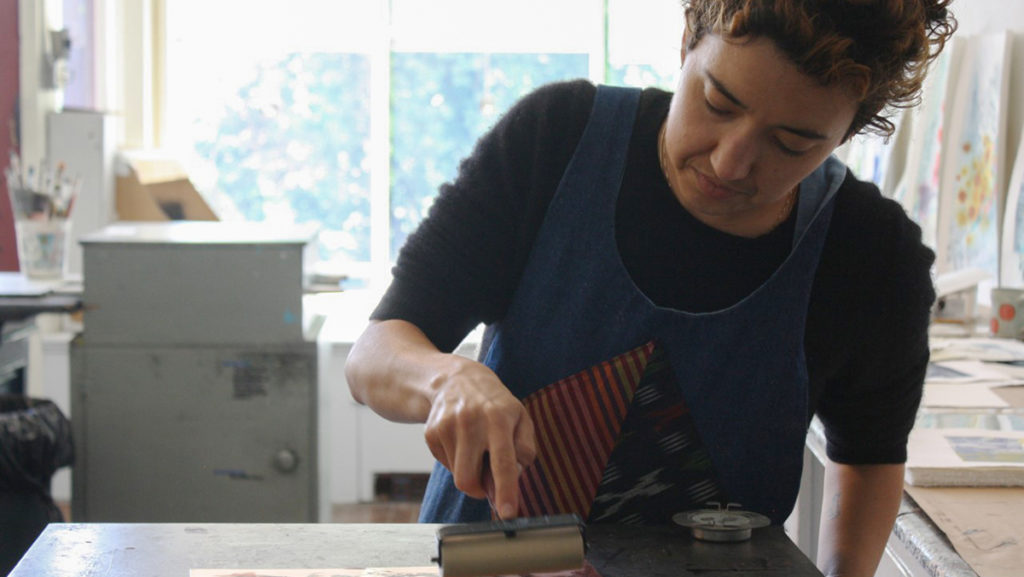While most professors have been using Zoom to instruct students, some faculty members at Ithaca College have taken this opportunity to share more personal experiences and research interests with the college community. Natasha Bharj, assistant professor in the Department of Psychology, was interviewed about her pathway through academia, her research on women’s sexuality and her experience as a first-generation college student Oct. 13 for the F2F: Feminist to Feminist, Faculty to Faculty conversation series.
“I kind of kept stumbling into doing my master’s and then continued to grad school and was lucky to end up in the right place,” Bharj said.
F2F is co-sponsored by the Women’s and Gender Studies program and the Finger Lakes Environmental Film Festival. The series was organized by Claire Gleitman, Women’s and Gender Studies coordinator and professor in the Department of English, and Patricia Zimmermann, professor in the Department of Media Arts, Sciences and Studies and co-director of the Finger Lakes Environmental Film Festival.
F2F is a new series held once a month, with every conversation focusing on a different discipline. During every event, a senior faculty member interviews a midcareer faculty member about their research and how they ended up where they are now. The next event will be held Nov. 18 and will feature Jennifer Jolly, professor in the Department of Art History, interviewing Paloma Barhaugh-Bordas, assistant professor in the Department of Art. The last F2F event will be Dec. 20 and will feature Zimmermann interviewing Jennifer Spitzer, assistant professor in the Department of English.
“We framed [F2F] initially to focus more on the idea of introducing new faculty and their projects to the campus,” Jolly said. “We haven’t framed it explicitly in terms of defining this or that feminist position. But in all the interviews that I’ve heard so far, the theme of feminism does become apparent in their work and the way in which they’re thinking critically about their discipline.”
Zimmerman said that F2F is an interdisciplinary space for professors to discuss their research and students to get a glimpse of what academic research looks like.
“Professors do more than teach,” Zimmermann said. “We felt this great need during the pandemic … and to model for students that we carry on with our research agenda, no matter what the situation is. [F2F] focuses on faculty scholarship and invites students to enter into the world of faculty research, in a very aspirational way, to really hear how professors have interdisciplinary dialogues about ongoing research projects.”
Jolly said she plans to ask Barhaugh-Bordas about her work in printmaking and how she became an artist.
“What I’m most interested in hearing about … is what makes her tick as a creative person,” Jolly said. “What makes her curious? Who is she reading? Who is she looking at and in dialogue with and what kinds of ideas does she want to leave her audience with when they engage with her work?”
Gleitman said that she, Zimmermann and other faculty members attended a workshop over the summer to improve online teaching skills, offered by the Center for Faculty Excellence. Gleitman said that an affinity group called Feminist Pedagogies Affinities Group grew out of the workshop to discuss issues in teaching feminism at the undergraduate level. The idea for F2F emerged from the affinity group’s conversations, Gleitman said.
“In our group, we found ourselves discussing the lack of opportunity on campus for feminist scholars to meet and talk together about their work and the lack of attention that is granted to faculty research,” Gleitman said via email. “We thought the F2F series would be a way to fill both gaps.”
F2F conversations are open to all members of the campus community. Gleitman said the first event had an audience of approximately 30 and the second event had slightly over 20 attendees.
Gleitman interviewed Kasia Bartoszynska, assistant professor in the Department of English, during the first F2F conversation Sept. 30.
During her interview, Bartoszynska discussed her forthcoming book, “Estranging the Novel: Poland, Ireland and Theories of World Literature,” which will be published by Johns Hopkins University Press next year. The book highlights Bartoszynska’s research into the connections between Polish and Irish literature.
Bartoszynska said that literature often influences stereotypes about gender.
“English literature people often mistakenly think of themselves as inventing gender studies or [literature] being the main place where gender studies happen because there is so much cultural theory, queer theory and gender studies theories there,” Bartoszynska said. “But one of the things about the Women’s and Gender Studies program is that it is truly an interdisciplinary program. Psychology and political science are both aspects of Women’s and Gender Studies.”
Jolly said that feminism is an interdisciplinary subject because feminism is ultimately about balances of power in society.
“All of us who are involved identify as feminists, and in the most general way for me what that means is I’m constantly interested in thinking critically about power relationships in society,” Jolly said. “In all the interviews that I’ve heard so far, the theme of feminism does become pretty apparent in their work. … How have disciplines been oppressive? How have disciplines confined people and ideas, and how can we critically interrogate the various assumptions of the fields that we work in?”








